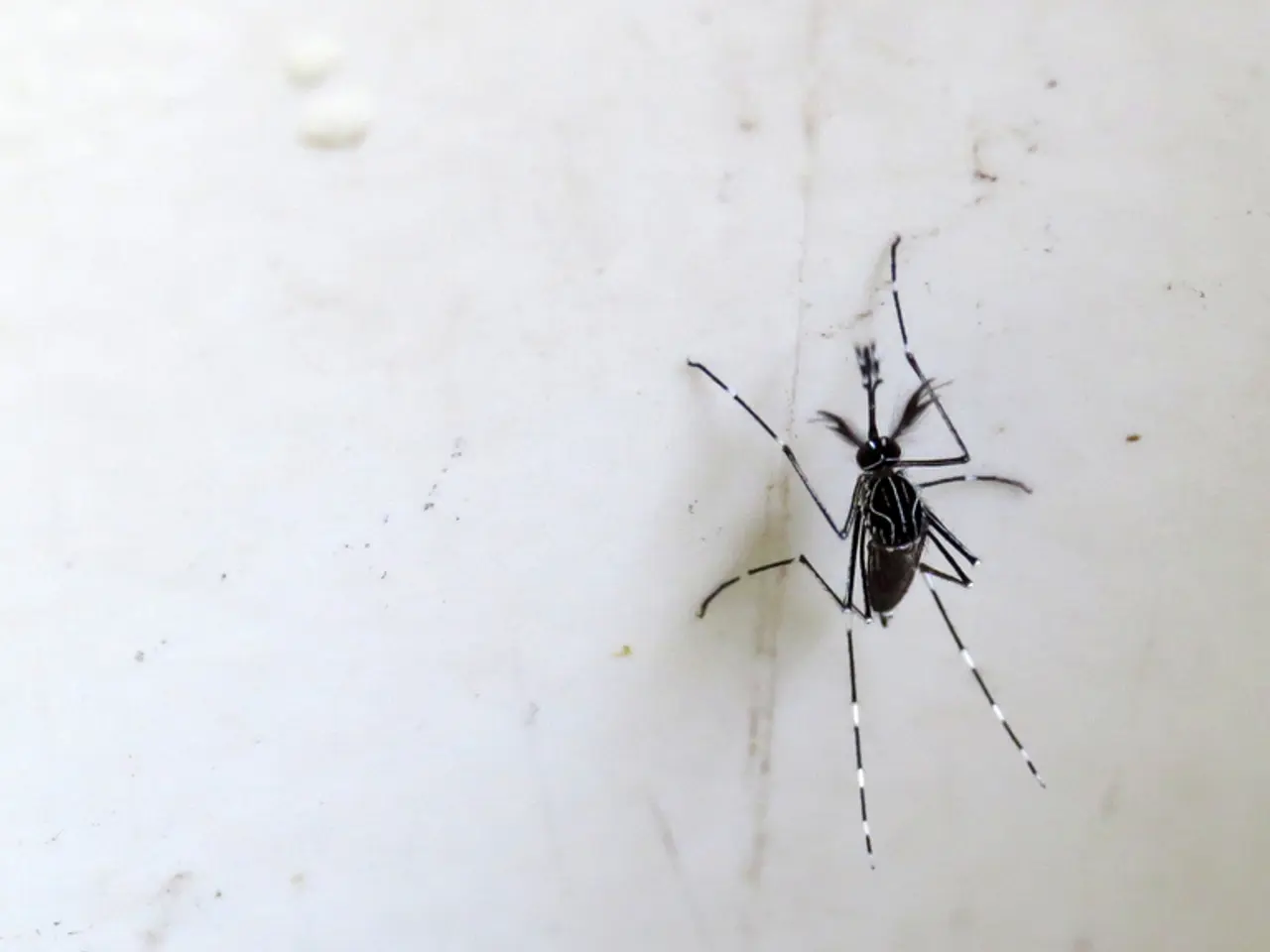West Nile Virus detected in Kentucky for the first time; authorities advise locals to adopt safety measures
Protect Yourself Against West Nile Virus: A Comprehensive Guide
A resident of Louisville, Kentucky, has been diagnosed with West Nile virus, marking the first confirmed human case of 2025 in the state. As the number of cases may increase, it's essential to take precautions to protect yourself against this mosquito-borne disease.
Beyond the usual advice, prevention methods for West Nile virus (WNV) include the following:
- Use of EPA-registered insect repellents: Repellents containing DEET, picaridin, IR3535, para-menthane-diol, oil of lemon eucalyptus, or 2-undecanone are proven safe and effective when used as directed. These repellents offer longer-lasting protection against mosquito bites. It's crucial to follow the label instructions for optimal safety and effectiveness.
- Personal protective clothing: Wearing lightweight, light-colored, long sleeves and long pants can help reduce mosquito bites, particularly during peak mosquito activity times (dawn, dusk, and early evening).
- Avoidance of outdoor exposure during mosquito peak activity periods: Limiting time outdoors during early morning, late afternoon, and evening reduces exposure to infected mosquitoes.
- Physical barriers: Ensuring window and door screens are intact, using bed nets, air conditioning, or fans to keep mosquitoes out of indoor spaces can provide additional protection.
- Environmental control measures: Eliminating mosquito breeding sites around homes by regularly emptying standing water from containers, flower pots, buckets, and bird baths; drilling holes in tire swings; keeping wading pools empty and turned over when not in use can help reduce mosquito populations. Using larvicides such as mosquito dunks in permanent water bodies like ponds can also aid in reducing mosquito populations.
- Community-level mosquito control programs: Participation in or support for local mosquito control efforts, including vegetation treatment near homes or larger standing water areas, which may require professional intervention, can help control mosquito populations.
- Blood and organ donation screening: Since WNV can be transmitted through blood transfusions or organ transplants, screening of donors is an important prevention strategy. People diagnosed with WNV should avoid donating blood for at least 120 days post-illness.
- Vaccine development is ongoing, but currently, no licensed vaccine for human use is available against WNV. Thus, prevention depends heavily on controlling mosquito exposure and bites.
In summary, to protect yourself against West Nile virus, it's essential to follow the usual advice and take additional precautions such as using EPA-registered insect repellents, wearing protective clothing, avoiding outdoor activities during peak mosquito-biting hours, and participating in community-level mosquito control programs. Louisville's Chief Health Strategist Connie Mendel urges everyone to protect themselves against mosquito bites.
[1] Centers for Disease Control and Prevention. (2025). West Nile virus: Prevention, diagnosis, and treatment. Retrieved from https://www.cdc.gov/westnile/prevention/
[2] Environmental Protection Agency. (2025). Insect repellents: Effective use against mosquitoes, ticks, and other pests. Retrieved from https://www.epa.gov/pesticide-registration/insect-repellents-effective-use-against-mosquitoes-ticks-and-other-pests
[3] World Health Organization. (2025). West Nile fever: Prevention and control. Retrieved from https://www.who.int/news-room/fact-sheets/detail/west-nile-virus
[4] Kentucky Department for Public Health. (2025). West Nile virus. Retrieved from https://dhph.ky.gov/dph/arboviral/Pages/west-nile-virus.aspx
[5] American Red Cross. (2025). West Nile virus. Retrieved from https://www.redcross.org/about-us/news-and-events/news/2025/west-nile-virus.html
- Regularly updating your knowledge about West Nile virus through reliable sources like the Centers for Disease Control and Prevention, Environmental Protection Agency, World Health Organization, Kentucky Department for Public Health, and American Red Cross can help you stay informed about the disease and its prevention measures.
- Aging, climate change, and environmental science factors can influence mosquito populations, making it important to understand how these factors might impact West Nile virus transmission in your region.
- Proper nutrition and skin care can help boost your overall immune system, making it less susceptible to infections and diseases, such as West Nile virus.
- Workplace wellness programs that focus on chronic diseases, cancer, respiratory and digestive health, eye health, hearing, mental health, sexual health, autoimmune disorders, and cardiovascular health may also address the potential risks associated with West Nile virus in the workplace.
- Treating and managing any existing medical conditions, such as diabetes, heart disease, or kidney disease, can help prevent complications if you were to contract West Nile virus.
- Therapies and treatments like cognitive behavioral therapy, meditation, and stress management techniques can help improve your mental health, which in turn can reduce your stress levels and strengthen your immune system.
- Pregnant women, senior citizens, and individuals with weakened immune systems may be at a higher risk for severe West Nile virus infections. Ensuring proper prenatal care, vaccinations, and maintaining a healthy lifestyle can help protect these vulnerable groups.
- Parenting involves modeling responsible behavior for children, such as wearing insect repellent, wearing protective clothing, and avoiding outdoor activities during peak mosquito-biting hours.
- Medicare benefits may cover diagnostic tests, treatments, and hospital stays related to West Nile virus, so it's essential to understand your coverage and seek medical attention promptly if you suspect an infection.
- In some cases, CBD, a compound found in cannabis, has shown promise in managing symptoms of neurological disorders, which may potentially include certain West Nile virus complications. That being said, further research is needed to fully understand the effects of CBD on West Nile virus and its treatments.
- Finances play a critical role in seeking proper medical care and addressing health-related concerns, such as West Nile virus. Effective wealth management, including budgeting, saving, debt management, and understanding health insurance coverage, can help mitigate financial stress related to treatment costs.




